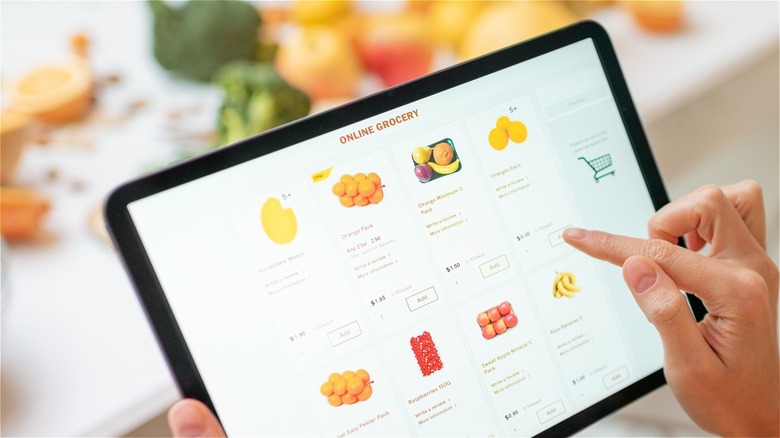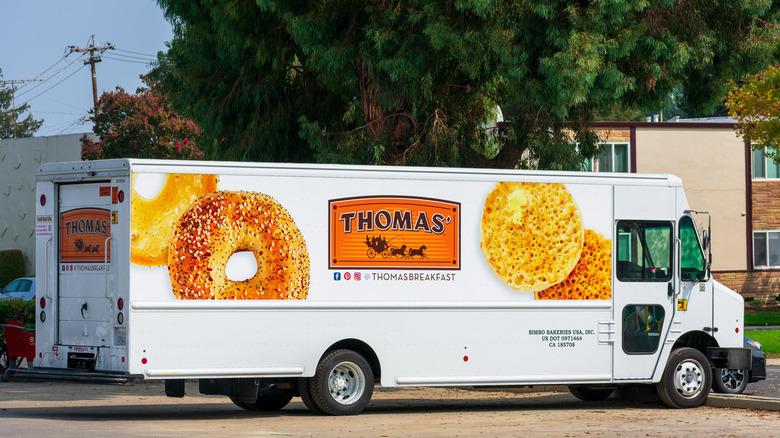Could Buying Groceries Online Actually Be A Better Value?
Home shopping is here to stay. Buying things online via grocery delivery services has gotten increasingly popular, and the pandemic intensified that reality (per the U.S. Census Bureau).
People shop online for convenience, though with increasing food costs, many customers looking to save at the grocery store avoid online shopping (see Grocery Dive and Insider). But are they right? Could grocery shopping online actually cost less? While an increasing number of articles have suggested online shopping could save money for some people occasionally (see Tough Nickel), outlets like New York Street Food and CNET seem to suggest that it's potentially better for most people.
CNET pitted the prices of Amazon Fresh and FreshDirect — including their fees — against a supermarket in their area: Stop & Shop. They found that the differences among the three were relatively minor in terms of price. For the 39 total items selected, FreshDirect was $182.27 before fees and 198.27 afterward; Amazon Fresh was 183.63 before fees and 201.63 afterward; Stop & Shop was 196.64 (no fees were added). The differences were very minimal — and that's before you factor in the gas to and from the supermarket and the time and hassle involved. Sounds like a slam-dunk for online groceries, right? Well, not so fast.
Depending on the service, your mileage may vary
If we look a little more closely at the CNET article, there are a few factors complicating their analysis. The first is that the online retailers referenced, FreshDirect and Amazon Fresh, do not serve all regions (FreshDirect is only in the Northeastern U.S.; Amazon Fresh's accessibility depends on zip code). Most supermarkets are regional, so this is an understandable challenge, but it limits its applicability to consumers across the nation.
Secondly, if we look at the itemized prices on their list, we see some definite surprises. CNET's study is dated June 27, 2022. The price listed for a 6-pack of Thomas' English Muffins is $5.59 at their local (Stop & Shop) supermarket. In our local area (where Stop & Shop is not an option), the several supermarkets tested (Kroger, Meijer, and Target) sold the same English muffins for anywhere between. $3.59 and $3.99. That is a pretty major price difference, and one we imagine would be replicated in many parts of the country. The listed price of $5.69 for a 9-ounce box of Cheerios was also considerably higher than we saw (where the price ranged from $4.19 to $4.69).
While the majority of the prices appeared more on-target, it's important to note that there can be a considerable range across the country and in different supermarkets. In addition, many price-sensitive shoppers adjust their purchases with sale and discount items (per AARP), which is hard to account for in this type of analysis.
Having your cake and eating it, too: convenience and affordability
So what's a price-savvy consumer to do? While CNET may have overstated the case, it's true that shopping in person doesn't save you as much as you might think. While in-store prices are still generally lower (per Ramsey Solutions), other aspects of online shopping may actually make it cheaper in practice for many consumers.
How so? There are psychological factors involved, for one: those who have looked into the situation (like Penny Pinching Mom, Money Pantry, and Money Under 30) note that online shopping is great for keeping people focused on buying only what they need. Many of us are prone to impulse shopping in the store; that problem almost goes away with online shopping, since we're exposed to fewer new things that catch our fancy. It's also much easier to keep a running tally of how much you're spending when you can see it add up in your shopping cart before you get to the register. Furthermore, you can comparison shop without having to drive across town to check the prices at another store, so you can see if sales elsewhere are a better match for your list. And last but not least is the savings in time and gas. When you add it all up, it's a pretty persuasive argument. Online grocery shopping may be more worthwhile than customers bargained for!


